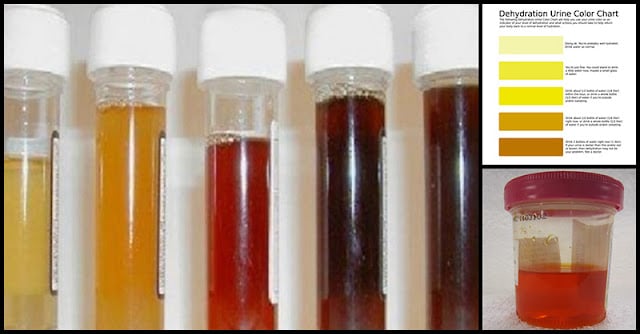Urine can reveal a lot when it comes to checking on what is really going on inside your body. Your urine’s odor, color, and consistency are all significant indicators of your health status and well-being.
Urine is mostly made-up of water and a list of ingredients like creatinine, sodium, chloride, urea, potassium, other dissolved ions, and various inorganic and organic compounds. The color, consistency, and odor of the urine can be affected by any sort of imbalance in the body.
A urine with a pale straw or transparent color is a sign of a properly hydrated and healthy body. Urochrome is the pigment that gives urine its characteristic yellow color. When the kidneys properly process waste products, urine takes on the yellow color.
The yellow pigment in urine can be diluted through a fluid intake, that’s why the more you drink the clearer your urine looks like. The color becomes more concentrated yellow when your body becomes dehydrated.
Here Are What Various Urine Colors Tell About Your Health
Colorless
Overhydration could be the reason behind your colorless or absolutely transparent urine. This means that you are drinking too much water.
The electrolyte balance in the body can be disturbed by excess water in your body.
Excess alcohol consumption can also cause your urine to turn clear.
However, if you’re not drinking enough water but still experiencing excess urination with clear urine color, then this could be a sign of diabetes.
Red
What you ate a few hours ago might be one of the reasons for this. Foods like beets, rhubarb, carrots, and blackberries can turn your pee a pinkish-red color. You don’t have to worry as your urine will be back to normal within the day if this is the case.
It is not a good sign if a red or ink urine color persists. It could mean a tumor in the kidneys or bladder. A blood in the urine could be a signal or mercury poisoning or a problem with the prostate. It may also be a sign of UTI or kidney stone.
Neon Or Dark Yellow
Having a vibrant, fluorescent or dark yellow urine is not a good sign. You may not be drinking enough water if you have amber of yellow-colored urine.
Some of the reasons for your dark yellow colored urine are severe dehydration, intake of B vitamins (especially B12), and certain medications supplements or vitamin pills.
Orange
A light orange shade of urine indicates mild dehydration.
Some other minor causes of orange-yellow urine are eating a lot of rich in beta-carotene foods, supplements, and medicines like vitamin B complex and several blood thinners.
Something is wrong with your liver or bile ducts if you notice more of a fluorescent orange color.
Actually, orange-colored urine can also be a symptom of jaundice.
Cloudy Or Murky
A cloudy or murky urine can be a sign of kidney stones or urinary tract infection (UTI). In the case of UTI, your urine will have a strong ammonia, foul or slightly sweet odor. Some other UTI symptoms include pain or burning sensation when you pee, urge to pee more often but passing only small amounts of urine, and pain in the lower abdomen.
Excess on minerals like phosphorus or calcium can also cause white, milky urine.
Green
Eating asparagus, green beer, black licorice, and artificial food coloring are the ones to blame for your urine’s greenish tint.
Some medications and drugs that contain dyes can also cause your urine to turn green.
In some cases, diarrhea can give a greenish tint to your urine. Likewise with a specific form of UTI called a Proteus infection.
Blue
In a very rare case, some people may notice a bluish tinge in their urine.
A genetic condition known as hypercalcemia, which means having excess calcium in the blood, can be the reason of your blue urine.
Medications that contain blue dye can also cause this bluish color.
Brown
Medication, diet, or certain health issues can be the cause of dark brown or cola-colored urine.
Eating large amounts of aloe vera, rhubarb or fava beans can cause brown urine. Likewise, muscle relaxant, laxatives, and antimalarial drugs can also darken urine.
Aside from these, some kidney and liver disorders like liver cancer, acute hepatitis, and cirrhosis can turn your urine dark brown.
Dark brown urine is linked to porphyria, which is a rare, inherited disorder of the red blood cells.









